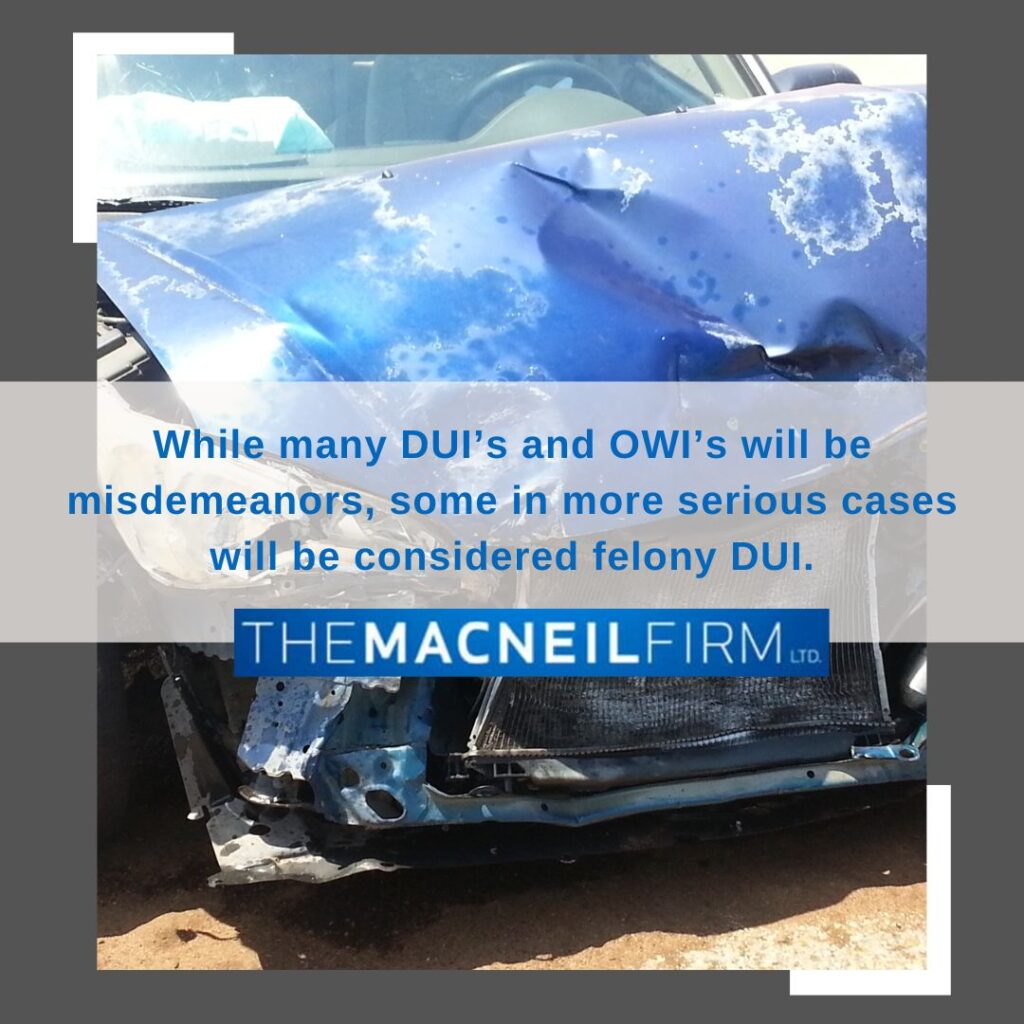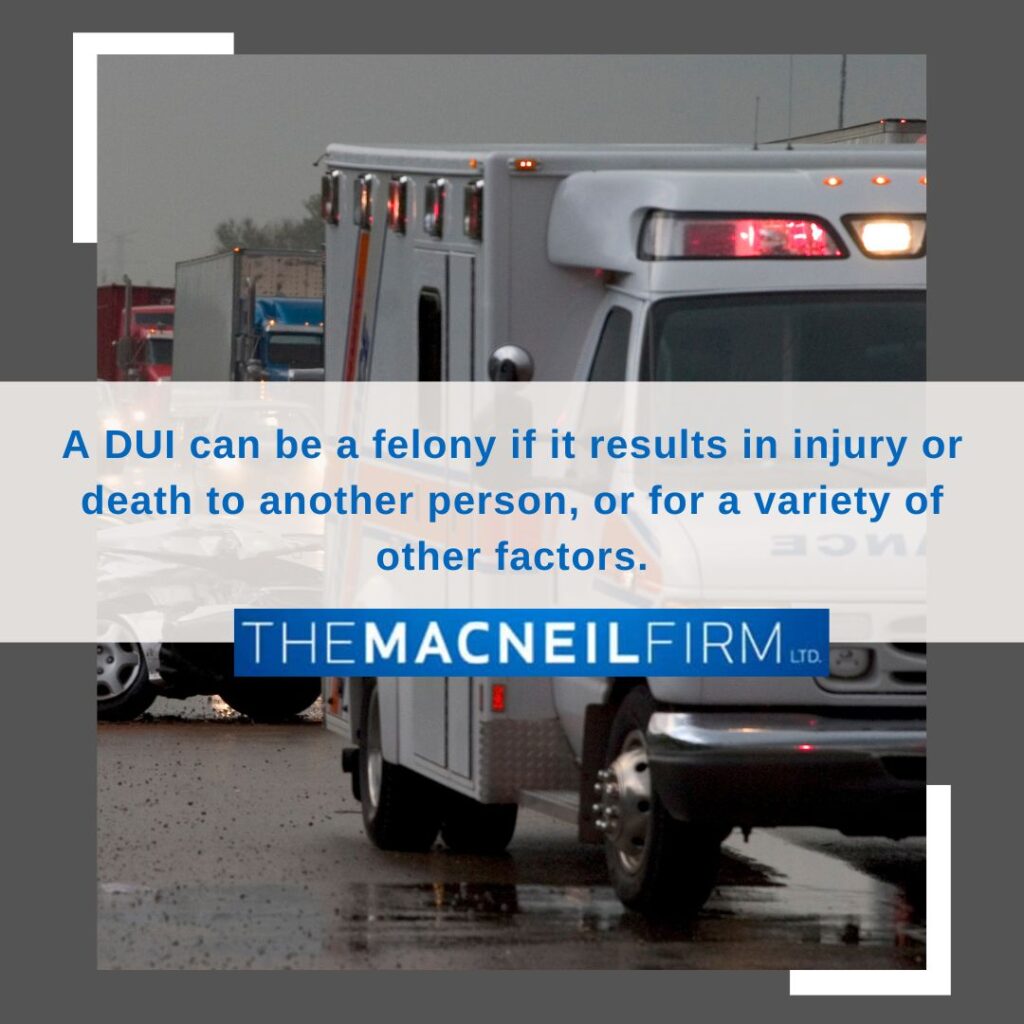While many Driving Under the Influence (DUI) and Operating While Intoxicated (OWI) charges will be misdemeanors, some, in more serious cases they will be considered felony DUI. This has a big impact on the consequences of your arrest, and the possible punishments. A DUI or OWI can be charged as a felony for several different reasons. In most cases, it is either because of repeat offenses or because of the level of danger you placed others in as a result of your conduct.
The MacNeil Firm has a lot of experience with felony DUI. We have represented individuals charged with aggravated DUIs based on great bodily harm and those who were charged with a DUI involving a death. These cases are very difficult, because there is a victim that has reportedly been harmed by my client. Although these cases are challenging, we will do what we can to make sure you get the best results possible.
For more information on felony DUI, a free initial consultation is your next best step. Get the information and legal answers you’re seeking by contacting The MacNeil Firm today.
Common Aggravating Factors
In Illinois, aggravated DUI is distinguished, because that is generally a Class 4 felony. Unlike the first or second DUI, it is going to be a higher class of offense with more serious sentencing options. A DUI can be enhanced to a felony aggravated DUI for a variety of reasons such as:
- Prior DUI Conviction
- DUI without a valid drivers license or a suspended license
- DUI without valid liability insurance
- DUI that includes an accident resulting in great bodily harm or death
- If you are driving a limousine, taxi, or ride share and are arrested for DUI
- Having minor passengers in the car while driving intoxicated
It is always up to the state’s attorney whether to charge a felony DUI. Generally, an accident with great bodily harm is a basis to charge as an aggravated DUI even for a first DUI offense. As far as other charges in an accident or in any DUI arrest, the police are going to issue multiple tickets. They generally will issue as many citations as they can for any offense that may have occurred during the incident.
Our firm typically sees all kinds of other tickets like failure to yield, disobeying a traffic control device, failure to stop at a stop sign, speeding, improper lane use, and driving too fast for conditions. Whatever the circumstances are surrounding your case, we will evaluate all the evidence and create a solid strategy that will get you results.
What to do when you’re stopped for a DUI
When you are stopped by an officer, there are certain things you can and cannot do. You do not have the right to counsel at the time that they are administering the standardized field sobriety tests, but you do have the right to refuse them. Legally, standardized field sobriety tests can be refused without any sort of consequence or negative inference.
If an officer asks if you have been drinking, you do not have to answer that question either. However, you do have to provide an ID or driver’s license. And you do have to get out of the car if they ask you to. But you definitely do not have to answer any other questions about whether you have been drinking or taking drugs. In fact, it is best not to answer questions until you are able to speak with your attorney.
You should agree to take a blood or breath test only if you know for sure that your blood alcohol content is under 0.8 or if you know for certain that you do not have any controlled substances in your blood. Or in Illinois, if you know that you’re under the allowable limit for THC in your system.
Obviously, that is very hard or even impossible to determine. Unless you have not consumed any alcohol or substances for some period of time. Research suggests that cannabis stays in your system for up to a month, so you should consider carefully whether or not you should submit to a chemical test. Cases in which there is a chemical test that shows that you were over the limit or had taken an illicit substance are very difficult to win. Cases without a chemical test are much more manageable.
The police are required to give Miranda warnings under certain circumstances. If they fail to do so, it is not a basis for dismissal in any kind of criminal case. You could ask the court to suppress statements that you made that were in violation of Miranda. When you are stopped for a DUI, if there are aggravating factors, it could be considered felony DUI. An experienced attorney from The MacNeil Firm is here to help you.
The attorneys at The MacNeil Firm have experience dealing with felony DUI charges
The process in defending somebody in a felony DUI is the same, whether it is the first or their tenth, or whether no accident occurred or whether there was a death involved in the accident. Strategies and techniques are the similar in terms of contesting the chemical test, evaluating the field sobriety tests, and looking at the evidence as a whole.
When you have a situation where there is great bodily harm or a death involved, the stakes or potential consequences are much higher. Many lawyers that will handle first time offenders don’t feel comfortable handling felony DUI cases. However, this is not an issue for The MacNeil Firm. In fact, many lawyers unwilling to take such complex DUI cases refer them to us because of our abilities and experience.
Not every case can be completely won, but there are small victories to be obtained in every case. While obtaining a not-guilty verdict is definitely a win, avoiding a driver’s license suspension could also be a win. Being able to drive while your suspension is in effect, so you will be able to work, is a win. Avoiding a CDL disqualification is definitely a win too. All these different wins are possible, but will ultimately be determined by the specific set of facts in your case.
Negotiating to have a felony DUI case amended to a misdemeanor would be a victory. A person with multiple prior DUI arrests avoiding jail or prison could also be considered a great result. What a “win” means in your situation will depend on your particular set of facts and circumstances. That is why it is essential to have an experienced DUI attorney, who is experienced in the field, and will know how to get the best possible outcome for you after a DUI arrest. Contact us today for a free consultation.



